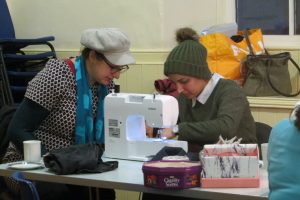The Multiple Benefits of Mending
The Multiple Benefits of Mending
The other day I was asked why I had started Simply Repair South Lakes. It got me thinking and I realised that my original purpose has expanded to encompass many more good reasons to carry on repairing.
Reduce waste
When I organised my first pop-up repair workshop back in November 2017 the main motivation was to reduce waste, reduce the amount of clothing, electrical goods and other household items that are condemned to ‘landfill’.
Many of you will have seen Stacy Dooley’s tv programme Fashion’s Dirty Secrets which exposed the disastrous environmental consequences of fast fashion and WRAP have calculated that £140 million worth of clothing goes into landfill in the UK each year.1 Unsurprisingly, electrical goods are the fastest growing waste stream in the UK, growing by 5% each year, however, almost 25% of waste electrical and electronic equipment that’s taken to household waste recycling centres could be re-used.2
The thing is, it’s often quite easy to mend clothes and electrical gadgets (although admittedly manufacturers don’t always make it easy with regard to electricals; that’s another story…) but the skills required are being lost. Over half the population don’t have the confidence to sew and 1 in 4 people can’t sew a button on.3 It was when I read this last statistic that I decided I wanted to do something.
Share skills
 I’m grateful that I inherited sewing skills from my Mother and I know other people of my generation and older that have acquired similar skills from their parents and grandparents. Many younger people haven’t had the opportunity to develop these skills but the good news is they are apparently keen to learn! So my plan was to bring the generations together in pop-up workshops where we could pass on skills and start a repair revolution in South Lakes! It’s been a great success so far with over 20 people volunteering their skills (this includes a couple of very skilled young people), more than 100 items of clothing repaired, nearly 100 electrical gadgets mended, several cuddly toys remade, some precious pots fixed (kintsugi style) and many happy customers who have learnt new skills.
I’m grateful that I inherited sewing skills from my Mother and I know other people of my generation and older that have acquired similar skills from their parents and grandparents. Many younger people haven’t had the opportunity to develop these skills but the good news is they are apparently keen to learn! So my plan was to bring the generations together in pop-up workshops where we could pass on skills and start a repair revolution in South Lakes! It’s been a great success so far with over 20 people volunteering their skills (this includes a couple of very skilled young people), more than 100 items of clothing repaired, nearly 100 electrical gadgets mended, several cuddly toys remade, some precious pots fixed (kintsugi style) and many happy customers who have learnt new skills.
Build resilient communities
To begin with I was less aware of the positive knock on effects of the repair workshops. It was clear that bringing the generations together to share skills would help the ‘fixers’ feel more valued. Some of our volunteers now have a new found enthusiasm for their ‘craft’ and have been inspired to go on courses and develop their skills even further. Thanks to funding from UnLtd, five of the volunteer electrical experts have trained to become PAT testers, and sewers have been inspired to experiment with new techniques and invest in new equipment.
What was less clear was the role that the pop-up workshops play in bringing communities together, but fixers and fixees alike have commented on the “wonderful, friendly, educational, helpful, fantastic” nature of these community events. It’s heart-warming to see people, who have come to get help with repairs, make friends with others over a cup of tea and then come back to future events to soak up the atmosphere. Dorothy has become a regular visitor and now happily works on her own repairs with a little guidance from the experts. Whilst I haven’t yet persuaded David, another regular, to have a go at sewing he did volunteer to do the washing up last time! The workshops attract people from all walks of life and all generations but everyone enjoys a shared sense of accomplishment having taught or learnt a new skill, fixed something or had something fixed, saved something from landfill and saved money on buying something new! It’s incredibly satisfying to see communities coming together over the simple purpose of mending things.
Improve health and wellbeing
 But it’s not just ‘things’ that are mended. Anyone who loves to unwind with a creative activity, whether it is knitting, sewing or upcycling a piece of furniture, knows how wonderful it is for relieving tension and pent up stress. Research has shown that the often repetitive and focused nature of crafting can send the body and mind into a zen-like state that is similar to what is achieved when practising yoga or meditation.
But it’s not just ‘things’ that are mended. Anyone who loves to unwind with a creative activity, whether it is knitting, sewing or upcycling a piece of furniture, knows how wonderful it is for relieving tension and pent up stress. Research has shown that the often repetitive and focused nature of crafting can send the body and mind into a zen-like state that is similar to what is achieved when practising yoga or meditation.
At the repair workshops we encourage people to watch, learn and have a go at mending things themselves, and learning does wonderful things for your brain. To get scientific, when you learn something your brain forms new synapses between neurons, this keeps your mind flexible and can help ward off age-related diseases such as Alzheimer’s. 4
So what are you waiting for?!
Through joining our repair revolution you too can reduce waste, help save the planet, save money, make new friends, learn new skills and improve your health and wellbeing! Do come and join us at our next pop-up event either as a volunteer or as a punter and start to reap the multiple benefits of mending.
1http://www.wrap.org.uk/content/clothing-waste-prevention
Now is the Time to Go Green.......

Now is the time to Go Green….
Did you know that 82% of millennials strive to be employed by a company publicly recognised for its ethics, while an overwhelming 92% of millennials are more likely to buy from a company committed to ethical business practices[1]. The case for “greening” your small business has never been more compelling. It benefits the health of your workforce, society, the planet and your bottom line.
To start you off, here are ten simple ways to green your business
- Save energy: Switch to LED light bulbs and ask staff to switch off computers and lights at the end of the working day.
- Avoid single-use plastic including drinks in plastic bottles. Promote the use of reusable items by investing in reusable coffee cups and water bottles for your staff.
- Do business with green suppliers. Find out which of them genuinely care about the environment. Could you switch to a competitor that takes its environmental and social responsibility seriously? Could you switch to a bank with an ethical investment policy[2] or a green insurance company[3]?
- Buy recycled printer paper and loo paper, rainforest friendly coffee, loose tea (or plastic free tea bags) and use green cleaning products. Group deliveries for the office kitchen and stationery cupboard into one big order from the same supplier to save on delivery miles or even better, buy locally.
- Make recycling easy by providing labelled bins in your office. You can even recycle your office furniture. Or you could upcycle your furniture instead of buying new[4].
- Encourage staff to walk, cycle or use public transport to get to work. Take advantage of the Cycle to Work scheme[5]. Have a working from home policy where appropriate and consider using video conferencing instead of travelling to meetings.
- Use a green energy supplier[6]
- Consider giving staff an extra day of leave to get involved in local environmental projects or, better still, use it as a team-building exercise. Alternatively, plant some trees[7] or sponsor someone to do it for you[8].
- Get ‘Green Small Business’ certification to promote your green credentials![9] (it only takes about an hour of your time).
- Make green thinking a part of your company culture. Engage your employees and customers in your vision.
Need help with any of this? Come along to our Green Business event in Kendal on Fri 15th March between 12noon and 2pm where you can sign up for FREE advice and half price ‘Green Small Business’ certification. More details here: www.eventbrite.co.uk/e/free-environmental-advice-for-businesses-tickets-56585194841.
Can’t make the event but still want advice on greening your business? E mail me: karen@bentley-brown.co.uk or call me on 07854 751169 (First session FREE for Cumbria-based businesses through Cumbria Chamber of Commerce’s Catalyst programme.) I look forward to hearing from you.
If you need more evidence that the time is right….
- Over a quarter of those who responded to a 2018 YouGov survey stated that they had avoided buying a product or using a service due to its negative environmental impact in the past year – an increase of 65% since 2016.
- Green energy use grew 56.3% in 2017.
- Ethical clothing increased by 19.9% and buying second-hand clothing for environment reasons increased by 22.5%.
- Ethical Food and Drink sales grew 16.3% in 2017, the largest increase since 2012, fuelled by growing sales of vegetarian and vegan products[10].
[1] https://sustaincase.com/chartered-institute-of-marketing-uk-millennials-love-csr/
[2] See the guide to ethical small business banking at https://www.ethicalconsumer.org/money-finance/shopping-guide/current-accounts-small-businesses-charities
[3] Such as https://www.naturesave.co.uk/business-insurance/
[4] check out The Coggin Group near Lancaster https://www.thecoggingroup.com/
[5] https://www.cyclescheme.co.uk/
[6] Check out Ecotricity who will also give a donation to the local charity Cumbria Action for Sustainability (CAfS) if you use this link https://www.ecotricity.co.uk/for-your-home?partner=CAFS1
[7] The Woodland Trust might be able to help with a grant https://www.woodlandtrust.org.uk/plant-trees/
[8] See https://www.woodlandtrust.org.uk/support-us/dedicate-a-tree/
[9] https://greensmallbusiness.com/
[10] https://www.ethicalconsumer.org/sites/default/files/inline-files/EC%20Markets%20Report%202018%20FINAL_0.pdf
Purposeful Plans for a Positive Impact
A Positive Case Study
I recently worked with a firm of architects. They looked very much like many other local architects when I browsed their website. They had well qualified, award winning architects on their team, some great case studies and offered a strong range of services with a personal touch. There was however a clue on their website that they were a bit different from their competitors as they offered ‘an education programme for primary and secondary schools where pupils can participate in the exciting, challenging world of architectural thought and creation.’ Great; I hadn’t seen anything like this before.
I met up with Laura, one of the partners, as they were in need of advice regarding breaking into new markets, and learnt that there was a whole lot more to their business than initially met the eye. In addition to delivering free workshops in schools they were keen business members of Kendal Brewery Arts Centre supporting community youth arts projects and they gave away tickets to events at the Arts Centre to people who wouldn’t normally get the chance to go there. They had very strong environmental credentials, had recently bought an electric car for their business in order to reduce their carbon footprint and were sponsoring a local ‘green build’ festival. On a personal basis, Simon one of the other partners, had set his sights on running more than 2,000 miles over a 12-month period to raise funds for Muscular Dystrophy UK after his friend’s son was diagnosed with the disease. Wow! I was blown away; this company really cared about their communities.
So we got to work on up-dating their business development plan: How could we get their business to stand out from the crowd and break in to the new markets they had their sights on? It was clear to me that this company was already well on its way to addressing the 3Ps; ‘people, profit, planet’, or the triple bottom line* business model, they just weren’t telling anyone about it. They needed to start telling their stories.
Plans are now in place to firmly embed their ethical credentials in their business. One of the first things the company did was to get their electric car ‘wrapped’ with their company details. Parking up in town after collecting their newly decorated car they were approached by a member of the public who needed the services of an architect. A few days later they received a call to ask if they would take on a new project; it turns out the man in the street had been impressed by their electric car and green credentials. Next on the agenda are up-dates to their website and an improved presence on social media. I’m looking forward to reading their stories and watching the company grow.
Talk to me about embedding your values in your business. Whether you are aiming to reach more customers, launch a new product or service, recruit new staff, maximise productivity (your own and your employees’), get more publicity or just make more profit then I can help you develop a purposeful plan for a positive impact.
Contact: Karen Bentley-Brown at karen@bentley-brown.co.uk or phone 07854 751169
*This is an accounting framework that looks at a company’s social, environmental and financial impact; more and more businesses are adopting this idea as consumers are increasingly aware of the negative impact that their consumption can have on communities and the environment.
Relevant Statistics:
Brands with a high sense of purpose have experienced a brand valuation increase of 175% over the past 12 years, compared to the median growth rate of 86% and the 70% growth rate for brands with a low sense of purpose. Kantar Consulting’s new Purpose 2020 report.
78% would tell others to buy products from Purpose-driven companies, and 68% are more willing to share content with their social networks over that of traditional companies. 2018 Cone/Porter Novelli Purpose Study


